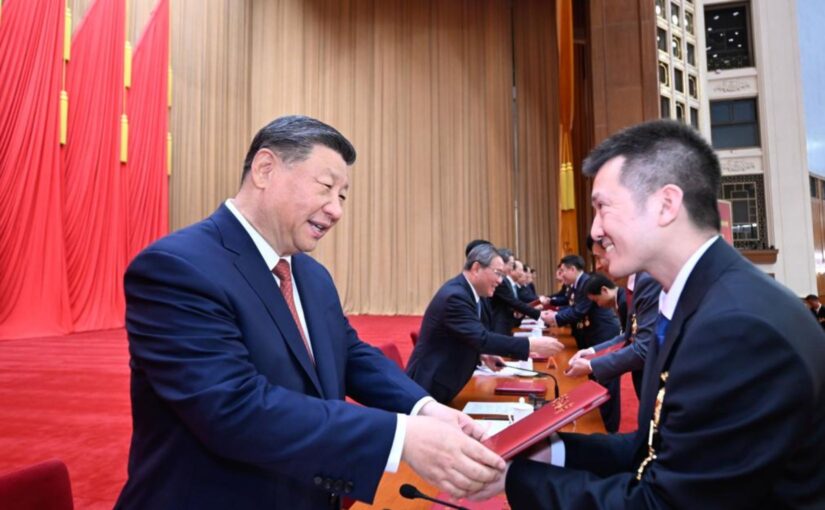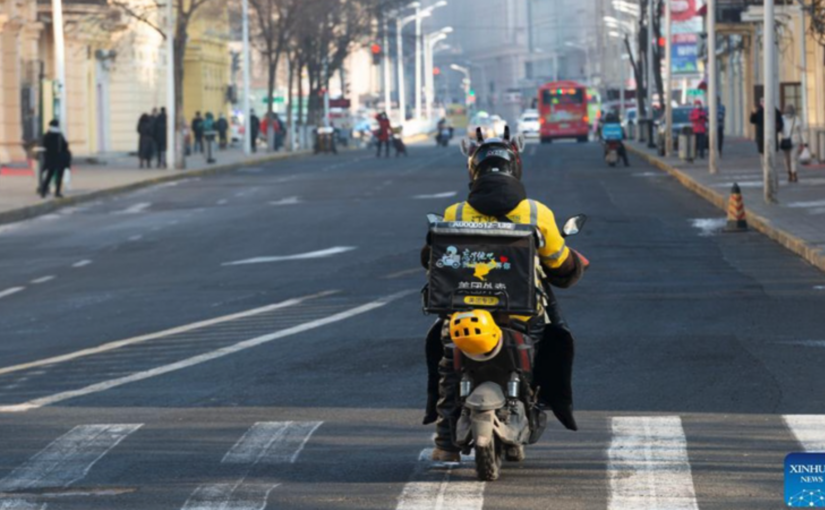As China prepared for the May Day holiday, President Xi Jinping, who is also General Secretary of the Communist Party of China (CPC) Central Committee and Chairman of the Central Military Commission, attended and delivered a significant speech at a grand gathering to celebrate the 100th anniversary of the founding of the All-China Federation of Trade Unions (ACFTU) and to honour model workers and exemplary individuals.
The gathering was presided over by Premier Li Qiang and attended by other senior leaders. A total of 1,670 people were honoured as national role model workers, and 756 were recognised as exemplary individuals.
In his speech, Xi said that as the May 1st, International Labour Day is approaching, we are celebrating the 100th anniversary of the founding of the All-China Federation of Trade Unions, reviewing and summarising the glorious course and great achievements of the country’s workers’ movement, commending national model workers and advanced workers, and aiming to further mobilise and inspire the country’s working class and the broad masses of working people to forge ahead on a new journey.
He said that on behalf of the CPC Central Committee, he would like to pay high tribute to the revolutionary martyrs and the older generation of trade union leaders who have made outstanding historical contributions to the Party’s labour movement.
“I would like to extend my sincere greetings to the workers, farmers, intellectuals and other working people of all ethnic groups across the country, to trade union organisations at all levels and all trade union workers. I would like to extend holiday greetings to friends in the trade unions and labour circles in the Hong Kong Special Administrative Region, the Macao Special Administrative Region and Taiwan. I would like to extend warm congratulations to the national model workers and advanced workers who have been commended.
“At the same time, on behalf of the Chinese working class and the broad masses of working people, I would like to extend my best wishes to the working class and the broad masses of working people all over the world.”
He noted that, on May 1, 1925, according to the decision of the CPC Central Committee, the Second National Labour Congress opened in Guangzhou, announcing the formal establishment of the All-China Federation of Trade Unions.
During the New Democratic Revolution, the Chinese trade unions united and mobilised the broad masses of workers to bravely throw themselves into the revolutionary torrent against imperialism, feudalism, and bureaucratic capitalism with a fearless revolutionary spirit. They fought bravely and made important contributions to achieving national independence and people’s liberation and establishing the new China.
During the period of socialist revolution and construction, the Chinese trade unions united and mobilised the broad masses of workers to actively participate in the construction of New China with a sense of ownership and passion, worked hard and built enterprises with arduous efforts, and sang the strong voice of the times that “we workers are powerful”. They made important contributions to consolidating the new people’s political power, establishing the basic socialist system, and advancing socialist construction.
In the new era of reform and opening up and socialist modernisation, the All-China Federation of Trade Unions has united and mobilised the broad masses of workers to shoulder the mission of the main force, actively participated in reform and opening up, and been enterprising and willing to make sacrifices, making important contributions to liberating and developing social productive forces and building socialism with Chinese characteristics.
“The 100 years since the founding of the All-China Federation of Trade Unions have been 100 years of combining Marxist labour movement theory with the concrete reality of the Chinese workers’ movement, and 100 years of the Chinese working class and trade union organisations unswervingly following the Party and working together to achieve the great rejuvenation of the Chinese nation. Practice has fully proved that the Chinese working class is worthy of being the most solid and reliable class foundation of the Communist Party of China, the leading class of our socialist country, the representative of advanced productive forces and production relations, and the main force in upholding and developing socialism with Chinese characteristics…. No matter how the conditions of the times and social groups develop and change, the status and role of the country’s working class cannot be shaken, the fundamental policy of relying wholeheartedly on the working class cannot be shaken, and the nature and functions of the country’s trade unions cannot be shaken.
“This path adheres to the Party’s overall leadership over the labour movement and trade union work, ensuring that the workers’ movement always moves in the right direction; adheres to the fundamental principle of relying wholeheartedly on the working class, giving full play to the role of the working class as the main force; adheres to obeying and serving the Party’s central task, so that the workers’ movement and trade union work consciously act in the [interests of the] overall situation; adheres to the political, advanced and mass nature of trade union organisations, giving full play to the role of the Party as a bridge and link to the masses of workers; adheres to serving the masses of workers as the lifeline, effectively safeguarding the legitimate rights and interests of workers and promoting their all-round development; adheres to carrying out work in accordance with the law and the constitution, and promotes trade union organisations and trade union work to continuously enhance vitality in keeping with the right path and making innovations.”
Continue reading Xi Jinping: We must adhere to the people-centred development philosophy



